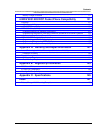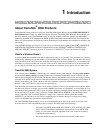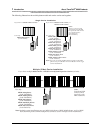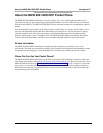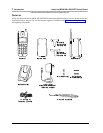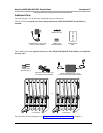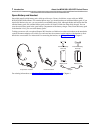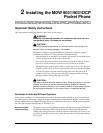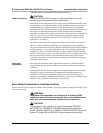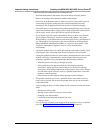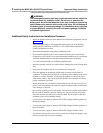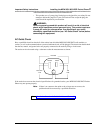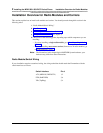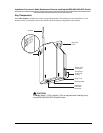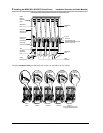
MDW 9031/9031DCP Wireless Pocket Phone Installation and Use
503-801-166 Issue 3 October 1999 7
2 Installing the MDW 9031/9031DCP
Pocket Phone
Important Safety Instructions
This book contains instructions related to safety labels on the product:
WARNING:
!
WARNING indicates the presence of a hazard that can cause severe or
fatal personal injury if the hazard is not avoided.
!
CAUTION:
CAUTION indicates the presence of a hazard that will or can cause minor
personal injury or property damage if not avoided.
This phone is designed to provide trouble-free performance without any special
maintenance procedures. To reduce the risk of accidental damage:
• Keep the phone in an area free of dust, smoke, and moisture; do not block the air
vents by placing objects on top of the radio module.
• Do not place the phone or battery charger near a heating duct, radiator, or other
heat source, and do not drop or expose it to excessive shock or vibration.
• Unplug the battery charger, radio module, or carrier if its power cord is damaged,
if liquid is spilled into it, or if its housing becomes cracked or otherwise damaged.
• To clean your phone, wipe the outside housing with a soft, dust-free cloth. If
absolutely necessary, you may use a cloth slightly dampened with a mild soap-
and-water solution. Dry quickly with a soft cloth.
!
CAUTION:
Your phone contains sensitive electronic parts. Never submerge it in any kind
of liquid, and never use liquid or aerosol cleaners, detergents, alcohols,
solvents, abrasive cleaners, or an excessive amount of water when cleaning
the housing and faceplate. To do so could result in irreparable damage.
Guidelines for Safe and Efficient Operation
Your wireless telephone is a radio transmitter and receiver. When the phone is turned on, it receives and sends
out radio frequency (RF) energy. The phone operates in the frequency range of 902-928 MHz. Your hand-held
wireless telephone uses the digital TDD mode. The power is transmitted in bursts at a 200 Hz pulsed repetition
rate. The peak envelope transmit power is 325 mW or less.
Exposure to Radio
Frequency Energy
The design of your wireless telephone complies with the latest Institute of Electrical
and Electronic Engineers (IEEE) and the American National Standards Institute
(ANSI) safety levels with respect to human exposure to RF energy. Of course, if you
would like to limit RF exposure even further, you may choose to control the duration
of your calls.



